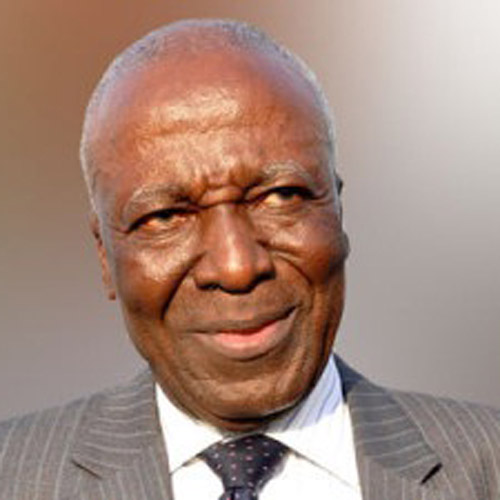
We are here to pay tribute to Honourable Justice Andrews Otutu Obaseki, Bachelor of Science in Agriculture, Reading, United Kingdom; Bachelor of Laws, London & Barrister-at-Law of Lincoln’s Inn, London; quondam Chief Registrar, High Court of Midwest Nigeria; quondam Acting Chief Justice, Midwest Nigeria: Justice of the Supreme Court of Nigeria; Life Member, Body of Benchers; Fellow, Fellow, Nigerian Institute of Advanced Legal Studies; Commander of the Order of the Niger; accomplished Jurist; and The Obaseki of Benin Kingdom. BORN on the 11th day of June, 1926 in Benin City, he attended Edo College, Benin City as a foundation student between 1937 and 1940; Hope Waddell Training Institute, Calabar, 1940-1942; School of Agriculture at Moor Plantation, Ibadan 1943-45; University of Reading, England, 1945-1948; the London School of Economics & Political Science, 1948-1951; and at the Council for Legal Education, London, 1949-1952. He thus had a varied and solid educational background which imbued him with a breadth of vision and high potential that were to yield good dividends in later years.
IN his private legal practice spanning 1952 to 1958, Andrews Obaseki became a powerful advocate and brilliant solicitor. Observing his sterling qualities, Government invited him in 1958 to set up the legal department of the Nigerian Building Society where he also became the staff solicitor. The same year, he was appointed President, Benin Divisional Grade A Customary Court, which was a Court of first instance, and President, Customary Court of Appeal for Benin Division, which laid the foundation for his long association with the Bench. Though the remuneration from these customary court appointments was not comparable to the rewards from private legal practice, Andrews Obaseki, fired by a crusading zeal to reform the customary courts and bring justice to the people at all levels, accepted to serve.
In 1960, Andrews Obaseki was appointed the supervising authority for all customary courts in the then Benin Province – covering Benin, Esan, Afenmai and Asaba divisions at the time, visiting all courts, exchanging views with the members and reviewing cases as necessary. He organized training courses for customary court members to ensure that the courts developed as temples of Justice, and not into instruments of oppression or vendetta. This was to have a parallel at the Supreme Court. Reflecting on the Nigerian court system, Justice Andrews Obaseki asserts that “Justice in the courts is the same whether in the native courts, the High Courts or in the Supreme Court; the measure is the same and it is only when there is an error in the application of the substantive law that the different levels come in to make the necessary correction…” In the year 1963, he was appointed Chief Registrar of the high court of Midwestern Nigeria, with the tasks of setting up magisterial districts & judicial divisions and grading posts in the judiciary in the state. Barely a year later, in March 1964, he was appointed a Judge of the high court of the region; later acting Chief Judge, which he held twice. His career was laced not only with knowledge in the law but also sagacity and common sense. He was outstanding in his dealings with those he controlled and the litigants whose cases he sat upon. The big break came in September 1975 when he was elevated to the position of a Justice of the Supreme Court [JSC] of Nigeria. A highly visible and articulate member of the apex Court, Hon. Justice Obaseki soon established unambiguous traits: He became renowned in his judgements and writing. He fought his wars and he wrote Volumes. He philosophized, pontificated, laid down his rules and bestrode the Supreme Court like a Colossus. Hon. Justice Obaseki at all times maintained his integrity, contemplative dignity and far-sighted impartiality. From many of his judgements on the Supreme Court Bench, a flood of legal wisdom poured forth. When he spoke, it was in measured tones, soft but poignant, calm but deep. Few words were wasted as he enunciated principles, explained values and laid down rules. The inclinations of a teacher, historian, political scientist and sociologist were all reflected as he admonished erring lawyers, overruled illogical conclusions and canvassed a new and more liberal national judicial order. The height which he attained has been beautifully sketched by the Nigerian Law Publications Limited in their book Justice Obaseki, Supreme Court Years, 1975-1991: His Notable Pronouncements (1991). With some 658 judgements comprising 530 concurring judgements, 2 dissenting judgements and 126 lead judgements given over a period of 16 years, Hon. Justice Obaseki demonstrated his wide knowledge base – derived from extensive reading, intensive studies, meticulous research, deep reflections, writing skills and brilliant oratory. It is no wonder that his colleagues of the Supreme Court attributed to him the learning and wisdom of “Coke and Littleton” who for centuries have been recognized as the greatest of the English jurists. Indeed Hon. Justice Kayode Eso [of blessed memory] described Hon. Justice Andrews Otutu Obaseki as “a great man by any standard and any yardstick, indeed by any in the world one of the acknowledged jurists in contemporary common law jurisdiction, or without being immodest, certainly in the history of jurisprudence in this country”.
Distinguished ladies and gentlemen, we are gathered here to celebrate a great Nigerian, a man of great intellect & wisdom, a Judge of Judges, among the finest and the best, a sage of liberal orientation, a philosopher, humanist and community developer. On the bases of his Exemplary and Courageous Service to the Advancement of our Legal System particularly in the area of Adjudication, it is with a sense of mission that we invite HIS LORDSHIP, HONOURABLE JUSTICE ANDREWS O. O. OBASEKI [JSC Rtd.] CFR, LL.D [Honoris Causa] a Great Nigerian, to step up and join the league of worthy recipients of the HALLMARKS OF LABOUR ROLE MODEL AWARD.
Congratulations!!!

